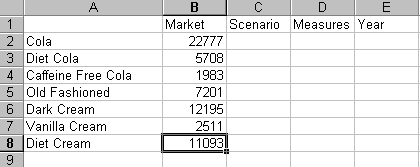When comparing numeric attributes, one can easily predict what you get when you specify a greater than (>) comparison between two numeric attributes. For example, Ounces is a numeric attribute consisting of various sizes of product, such as 12 ounces and 16 ounces. When you compare the two ounces, obviously 16 ounces is greater than 12 ounces. When you apply the same greater than comparison to text or Boolean attributes, however, the result is not so obvious. In Query Designer, the same operator produces different results depending on attribute types. All examples below use attribute dimensions in the Sample Basic database.
In this example, Pkg Type is a text attribute in Product, with members Bottle and Can. When you filter Products less than Can, the result is Caffeine Free Cola because its Bottle attribute contains an ASCII character that is less than the ASCII character for Can.
In this example, Caffeinated is a Boolean attribute in Product, with members Caffeinated_True and Caffeinated_False. For Boolean attributes, True equals to 1 and False equals to 0. The query below returns all Colas that are caffeinated.
In this example, Intro Date is a date attribute in Product, with members Intro_Date_03-25-1996, Intro_Date_04-01-1996, and so on. For date attributes, earlier dates are considered less than later dates. The query below returns all products introduced before July 26, 1996.





